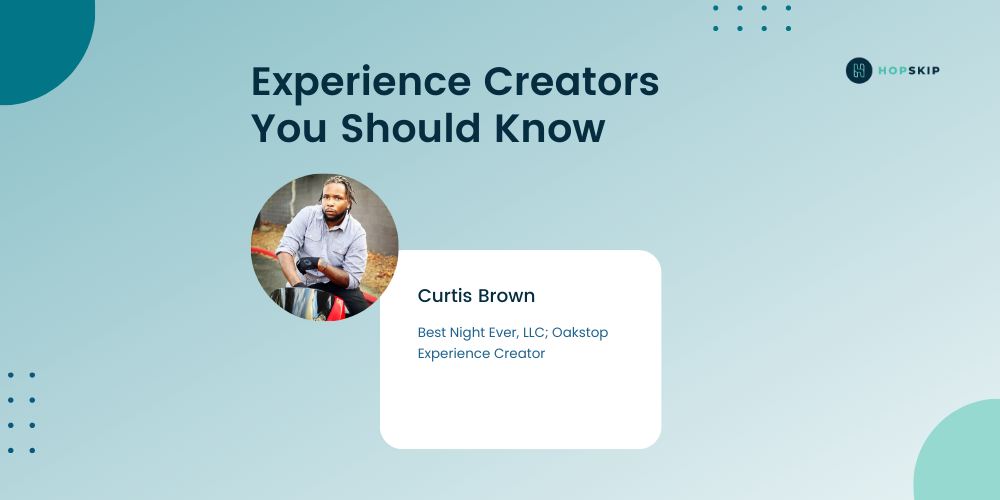Experience Creators You Should Know - Curtis Brown, Best Night Ever, LLC; Oakstop
Curtis Brown, of Best Night Ever, LLC; Oakstop, discusses how he honed his skills over the pandemic to now be in position to overcome the challenges that the new meetings/events landscape brings.
Luke Whalin
May 25, 2023

This post is part of the HopSkip Planner Spotlight Series where HopSkip spotlights planners across the industry to bring awareness of how they adapted to COVID-19, communicating and lessons learned and sharing how they are viewing the meetings and events industry in a post-pandemic world.
Name: Curtis Brown
Company Name: Best Night Ever, LLC; Oakstop
Job Title: Experience Creator
Years of Experience: 10+
How did you get your start in the events industry? What made you pursue this role?
My path to event production started at the age of 22. During that time, I attended countless social events and enjoyed my experiences. After experiencing a fair number of different types of events, I became fascinated with the inner components of how events create unique and memorable experiences for people.
How would you describe your role or responsibilities as a professional event planner?
My roles include, but are not limited to, the development of the event's theme and purpose; and the collaboration with key stakeholders and third-party vendors to transform the event’s vision to life.
How do you compare planning your first in-person event post-pandemic, to planning meetings/events pre- Covid? What was different and unique? What was similar?
What challenges have you faced in your work as a meeting and event planner, when working with suppliers or sourcing a venue and how did you overcome them?
Planning post-pandemic and pre-pandemic events are similar because, during both times, a significant priority includes tailoring the experience to the attendees – whether virtual, in person, or both. However, post-pandemic event planning differs significantly because, in my experience, I have relied on pre-sale tickets to guarantee a specific number turnout than same-day sales. Furthermore, post-pandemic event planning has fostered a higher level of creativity as more events emerge in the digital space.
The biggest challenge is securing a date and time based on the availability of the venue. For many experience creators like myself, overcoming this hurdle occurs with the use of an event calendar, which creates a skeletal outline. The skeletal outline is helpful to use as a tool to execute planned and even unforeseen tasks needed before the event, such as securing the venue or addressing a last-minute change to the event’s start time based on the venue’s availability.
How do you determine which vendors are best suited for your stakeholder's needs while also finding those providing competitive services at affordable rates?
My process is typically to understand the client’s desires in terms of venues. Then I will start with vendors I have previously worked with that fit within the scope of the client’s budget. If the client is unsatisfied, I will typically consult with other colleagues on other vendors who fit within the client’s budget range as additional alternatives. The goal is always to find vendors who can execute the client’s desires within their budget.
Are there any key lessons or insights that have shaped your approach to event planning over the years?
Two key lessons are: 1) take a detailed look into the hospitality business – learning how to cultivate customer service and 2) hone in detail/micromanaging skills to apply to the execution of events.
Be prepared to outsource or alternatively execute the tasks yourself if you are unable to staff events.
Are you approaching contracting with hotels differently, post-pandemic?
Typically, I have outsourced to different venues for event spaces other than hotels. For example, I used co-working spaces such as OakStop.
What is the biggest area of improvement that you think hotels can make when either responding to your RFPs or during the contract phase of your event?
Due to the pandemic, our events community had to evolve, adapt, and grow. Many planners started to embrace new technologies as a result of the pandemic. What new tech are you using today in your planning process as a result?
Since education and relationships are two major pillars in the meetings and events industry, any suggestions on how other planners can learn and network with their peers across the industry?
Responding in a timely manner. Post-pandemic events are on the rise. Therefore, securing timely responses to RFPs provides sufficient time to secure a venue before it becomes unavailable due to the scheduling of other events.
QR codes are helpful. It is helped disseminate information to people quickly, and in vast numbers. Furthermore, the use of social media as an event promotion tool has been incorporated into my event planning and has grown in significance since the pandemic.
My advice would be to attend networking mixers. Mixers for experience creators are on the rise. I would further recommend connecting with people in the events industry using LinkedIn and other social media platforms.